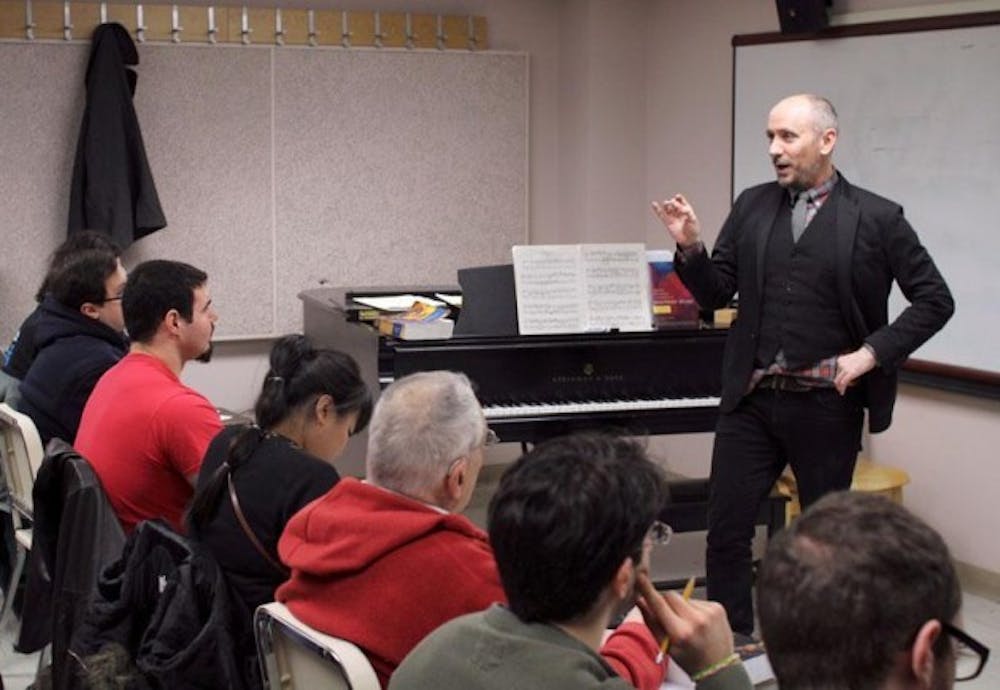As a young boy in a London suburb, James Currie sat improvising on a piano, wearing his mother's clothing and referring to himself as "Lady Beronia Jackson."
Today, Currie's passion for performance lives on in UB's Musicology department. From childhood drag queen to bullied high schooler, Currie believes his current professorial career owes itself to his persistent love for performing arts.
"I was a crazy little kid, a real flamer as a child ... like, a massive flamer," Currie said. "In a certain way, it's been 43 years of taming down. I found myself quite early."
Currie arrived in the United States in 1992 and began working toward receiving his Ph.D. He holds a bachelor's degree from Cambridge and a Ph.D. from Columbia; he is the author of the book Music and the Politics of Negation; and he has a 4.6 ranking on ratemyprofessors.com. Now, he is an associate professor of music and lectures on the history of musicology with a consistent stage-orientated mentality.
Although Currie has always been musically and theatrically inclined, his formal training didn't begin until he was about 10. Soon afterward, he began playing the viola and joining orchestras, which led to a relatively steady form of socializing during his adolescent years. As a young gay boy with few friends, the performing arts became a refuge for Currie during a difficult period.
"You hear these kinds of stories all the time: the effeminate, probably-gonna-be-gay person finds some kind of solace - just space, basically - in either acting some kind of fantasy within the performing arts or just the fact that the arts create space," Currie said. "In order to sit at the piano and play, or do a still life, or write, you simply have to push a lot of things to the side. Otherwise, you can't concentrate."
Much of Currie's academic work focuses on the phenomenon of creating "the space that is made by the concentration necessary to create something we call art," he said.
Colleagues like Tony Arnold, an associate professor of music, and students find the reverence and passion Currie has for his work inspiring.
Currie's lectures have "an uncanny ability to draw together threads from a wide variety of disciplines ... and spin them into illuminating narratives about the very nature of music, its intrinsic value and integral position at the core of our existence," Arnold said in an email.
She believes his pedagogical strength lies not only in his expansive knowledge of music, but also "his ability to connect on a human level."
Currie's humorous attitude has won him glowing reviews within the music department's community.
"I'm obviously not afraid to make a fool of myself," he said.
Currie is frequently dressed for lectures in button-up vests and is never afraid to strike a goofy pose. Ross Aftel, a graduate student studying historical musicology and music theory, said class with Currie is far from dull.
"Dr. Currie is very witty, everyone loves his accent and it does not take that much for him to keep the class engaged," Aftel said. "He develops fascinating lectures for his students, devotes time for anyone who needs extra help and he's very passionate about what he does."
Currie's passion amplifies his liveliness in the classroom. His theatrical lectures keep everyone engaged and attentive, according to Rachel Wu, a graduate student studying piano in the musicology department.
"He's very funny; he's always moving around and acting silly," Wu said. "He makes fun of himself, especially when he plays piano. He'll pretend to choke when he messes up, and he'll stick out his tongue and make a funny noise."
Wu believes this self-deprecating humor lightens the mood in an otherwise all-too-serious class. Creating an atmosphere in which everyone feels comfortable participating and reacting sincerely to the material presented "makes everything easier."
Currie believes his popularity among students and faculty stems more from his love of performance than his love of teaching.
"My need for a performance base is oddly catered to two or three times a week when I have to stand in front of a fee-paying audience," Currie said. "I don't even have to see how much money people put in the jar at the end of the evening - I just get a paycheck. It's a weird, odd fortuity."
Although Currie prefers the aspect of performance to the aspect of education in his teaching profession, his relationship with students is one of mutual affection.
"They're very smart kids," Currie said. "They don't have an entitled relationship to what you should know and what you shouldn't know. There is a feeling of excitement that can come with teaching in a place like this, which is very important to me."
This semester, Currie is teaching Music History II and Enlightened Postmodernity.
Currie may no longer play under the name "Lady Beronia Jackson," but he is still happily performing - most often in front of an audience of students - remembering how much music has served as his nearly life-long salvation.
email: features@ubspectrum.com





